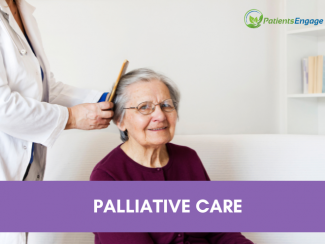
Palliative care at home can be best executed if certain preemptive measures are taken in a disciplined manner to avoid pitfalls and also to ensure comfort and peace for the person with a condition, says Usha Ravi
Palliative care at home can be custom-made for many seriously and terminally ill patients, which ensures tender loving care with comfort and dignity in their own familiar environment. Provision of such compassionate care doesn’t hasten death, but rather enables an individual to live the last stretch of his life in comfort and peace.
हिंदी में पढ़ें: उपशामक देखभाल के लिए अपने घर को कैसे तैयार करें
Caring for loved ones can be both physically and emotionally challenging. But certain services can be accommodated which can be structured according to the needs and wishes of the ill patients. Some of the aspects of a similar set up for my Mum’s care at home could be good indicators:
- Remember the manpower you have at home needs to stay constant and always be accessible
- Mobilise and schedule all the necessary assistance of valuable members of the family and community prior to bringing your loved one home
- Ensure a safe and comfortable physical set up
- Organise the much needed comfort medications. Food and water should also be kept readily available
- Organise supplies ( Washers, plastic covers for linens, washing arrangements, deodorants)
- Create a calming, soothing, warm and cosy environment.
- Frequently change the position of the loved ones in bed to avoid bed sores and skin irritation which can often turn serious if not adequately cared for
- Make them sit up as often as they are able to and help them be in a position that enables them to breathe easy.
- Attend to nature’s call, particularly if they become incontinent of bowels and bladder
- Keep the loved ones safe in the bed, particularly when they become agitated, restless and confused
Other Details
- Schedule assistance and ensure the contact numbers are kept handy and are well organised ( list of people to be accessed in a timely manner).
- When it becomes necessary, it is also important to give oneself, as the caregiver that much needed rest and sleep, in order to be able to provide quality care for your loved one.
- Organise the healthcare worker’s visit on a regular basis and also note the questions to be asked and clarified
- Procure advice on nutritional and hydration support as well as medicine schedule. It always helps to maintain a diary with details like the amount and item offered.
- Order a bed or ensure the bed is in a well-lit and ventilated room, close to the toilet. This enhances a sense of well-being, and helps the patient to feel refreshed, calmer and cleaner.
- Please consider your loved one’s choice of room and/or items as requested ( My Mum requested that she be allowed to spend her last days in my Dad’s bed, and also to be able to use my Dad’s blanket)
- Bed cover with plastic or draw sheets (To protect the bed from getting soiled and wet). This reduces the time and effort spent in washing some of the difficult to wash objects like the mattress on the bed.
- More than few firm pillows to pad or to elevate the head of the bed, if using a regular bed. This really makes a huge difference, particularly in cases of difficulty in breathing.
- Use of existing gastric tubes ( particularly very useful in administering pain and sleep medicines as hydration and nutrition as required). My Mum had choice of food she liked to eat and less favourite ones being given via tube
- Oxygen tank with right sized mask or nasal prongs, this alleviates the stress of air hunger.
- Nebulizer chamber with mask for (saline or Ventolin) as required
- Bedside commode chair and/ or bed pan. Initially this still gives the individual the feeling of independence and protects the sense of worth, by preventing self-embarrassment from incontinence.
- Use of incontinent pads to prevent skin break down as your loved one drifts off to that stage of unconsciousness.
What really worked for my Mum were:
- All of the above with loads of affection by all of her children and grandchildren around her taking turns to read religious books, prayer books or playing hymns.
- My Mum also was given transparent updates about her stage of illness, what to expect, what she was going through, the medications and its effect, etc.
- My Mum also loved special head and feet massage given by me.

Born and schooled in India, Usha Ravi migrated to the USA to work and then moved to Australia. Currently works in the area of critical care as an Advanced Nurse Practitioner (ANP) in Paediatric Critical Care. Supports community work at various levels. She truly believes clinical practice is her passion. In service for the last 24 years, she performs music to re-energize myself to embrace the everyday challenges. Together, with her husband and children and a very hyperactive working dog, they make a lovely home leaving her no time and reason to complain.






